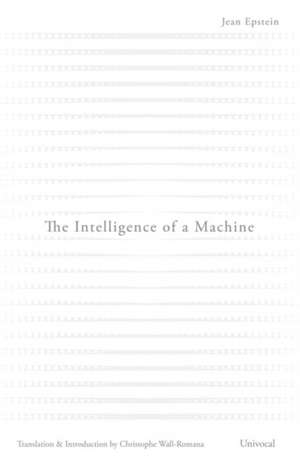The Intelligence of a Machine: Univocal
Autor Jean Epsteinen Limba Engleză Paperback – feb 2014
The advent of the cinema radically altered our comprehension of time, space, and reality. With his experience as a pioneering avant-garde filmmaker, Jean Epstein uses the universes created by the cinematograph to deconstruct our understanding of how time and space, reality and unreality, continuity and discontinuity, determinism and randomness function both inside and outside the cinema. Time, he says, should be regarded as the first, not the fourth, dimension—and the cinematograph allows us, for the first time, to manipulate it in directions and speeds of our choosing.
The theoretical work of Jean Epstein greatly influenced later generations of cinema philosophers, notably Gilles Deleuze and Jacques Rancière, but the bulk of his work remains unpublished.The Intelligence of a Machine, his first major title published in English, is one of the earliest philosophies of cinema.
Din seria Univocal
-
 Preț: 152.92 lei
Preț: 152.92 lei -
 Preț: 154.19 lei
Preț: 154.19 lei -
 Preț: 169.04 lei
Preț: 169.04 lei -
 Preț: 169.34 lei
Preț: 169.34 lei -
 Preț: 151.99 lei
Preț: 151.99 lei -
 Preț: 137.79 lei
Preț: 137.79 lei -
 Preț: 169.70 lei
Preț: 169.70 lei -
 Preț: 102.45 lei
Preț: 102.45 lei -
 Preț: 130.22 lei
Preț: 130.22 lei -
 Preț: 138.14 lei
Preț: 138.14 lei -
 Preț: 127.42 lei
Preț: 127.42 lei -
 Preț: 176.61 lei
Preț: 176.61 lei -
 Preț: 169.34 lei
Preț: 169.34 lei -
 Preț: 118.58 lei
Preț: 118.58 lei -
 Preț: 153.99 lei
Preț: 153.99 lei -
 Preț: 130.89 lei
Preț: 130.89 lei -
 Preț: 153.24 lei
Preț: 153.24 lei -
 Preț: 137.48 lei
Preț: 137.48 lei -
 Preț: 138.46 lei
Preț: 138.46 lei - 9%
 Preț: 141.33 lei
Preț: 141.33 lei - 13%
![[...After the Media]: News from the Slow-Fading Twentieth Century](https://i1.books-express.ro/bs/9781937561161/after-the-media.jpg) Preț: 141.58 lei
Preț: 141.58 lei - 18%
 Preț: 126.61 lei
Preț: 126.61 lei - 18%
 Preț: 126.61 lei
Preț: 126.61 lei - 14%
 Preț: 139.36 lei
Preț: 139.36 lei - 19%
 Preț: 123.77 lei
Preț: 123.77 lei - 10%
 Preț: 139.36 lei
Preț: 139.36 lei - 15%
 Preț: 129.59 lei
Preț: 129.59 lei - 10%
 Preț: 139.36 lei
Preț: 139.36 lei - 5%
 Preț: 130.75 lei
Preț: 130.75 lei - 14%
 Preț: 140.42 lei
Preț: 140.42 lei - 29%
 Preț: 97.20 lei
Preț: 97.20 lei - 22%
 Preț: 166.45 lei
Preț: 166.45 lei - 29%
 Preț: 97.20 lei
Preț: 97.20 lei -
 Preț: 189.13 lei
Preț: 189.13 lei -
 Preț: 142.31 lei
Preț: 142.31 lei -
 Preț: 145.74 lei
Preț: 145.74 lei -
 Preț: 231.11 lei
Preț: 231.11 lei
Preț: 189.19 lei
Nou
Puncte Express: 284
Preț estimativ în valută:
36.20€ • 37.89$ • 30.13£
36.20€ • 37.89$ • 30.13£
Carte indisponibilă temporar
Doresc să fiu notificat când acest titlu va fi disponibil:
Se trimite...
Preluare comenzi: 021 569.72.76
Specificații
ISBN-13: 9781937561185
ISBN-10: 1937561186
Pagini: 111
Dimensiuni: 124 x 194 x 10 mm
Greutate: 0.17 kg
Ediția:1
Editura: University of Minnesota Press
Colecția Univocal Publishing
Seria Univocal
ISBN-10: 1937561186
Pagini: 111
Dimensiuni: 124 x 194 x 10 mm
Greutate: 0.17 kg
Ediția:1
Editura: University of Minnesota Press
Colecția Univocal Publishing
Seria Univocal
Notă biografică
Jean Epstein (1897–1953) was a noted French avant-garde filmmaker, poet, fiction writer, and one of the earliest philosophers of cinema.
Christophe Wall-Romana is associate professor in the Department of French and Italian and an affiliated faculty memner in moving image studies at the University of Minnesota.
Descriere
The advent of the cinema radically altered our comprehension of time, space, and reality. With his experience as a pioneering avant-garde filmmaker, Jean Epstein uses the universes created by the cinematograph to deconstruct our understanding of how time and space, reality and unreality, continuity and discontinuity, determinism and randomness function both inside and outside the cinema. Time, he says, should be regarded as the first, not the fourth, dimension—and the cinematograph allows us, for the first time, to manipulate it in directions and speeds of our choosing.
The theoretical work of Jean Epstein greatly influenced later generations of cinema philosophers, notably Gilles Deleuze and Jacques Rancière, but the bulk of his work remains unpublished. The Intelligence of a Machine, his first major title published in English, is one of the earliest philosophies of cinema.
